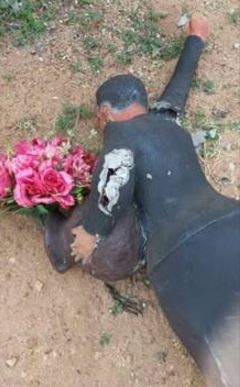BY: MAHMOUD AKOT
The controversy surrounding the fall of a statue in South Sudan’s parliament reflects a deeper crisis, one that extends beyond the incident itself to the collective consciousness and priorities of the society. When a simple event like this is overly magnified and attributed with unrealistic symbolism—such as divine punishment or a political message—it clearly demonstrates a troubling state of intellectual and social vacuum plaguing the nation.
The people of South Sudan, who have historically fought for freedom and dignity, now face an unsettling reality. How did their energies, once directed toward building a better future, devolve into preoccupation with trivialities and superficial interpretations of events?
The real fall: A crisis of awareness and thought
The fall of the statue inside parliament is not merely symbolic; it is a reflection of a more profound collapse—one of thought and the ability to address core issues. When the hope for meaningful change is absent, societies become more susceptible to distractions from transient and marginal matters. Shifting focus from addressing real challenges to chasing empty symbols, such as a statue in parliament, highlights a collective incapacity that hinders tangible progress.
Focusing on the marginal while ignoring the essential
When the fall of a statue becomes a major talking point while society grapples with severe challenges like poverty, deteriorating education, and inadequate healthcare, it signals a profound misalignment of priorities. This crisis did not emerge overnight but is the result of years of frustration and disappointment, where the community lost its ability to distinguish between critical issues and trivial distractions.
The role of leadership in creating this reality
Political leadership bears direct responsibility for this grim reality. When vision is absent and institutions fail to deliver tangible solutions to citizens’ crises, a vacuum emerges, filled with superficial interpretations and misplaced symbols. The fall of the statue would not have attracted much attention if the community had seen leadership capable of instilling hope and fulfilling its aspirations in concrete ways.
The path forward: Focusing on real priorities
South Sudan urgently needs to reorder its national priorities, moving away from symbols and appearances that do not bring about real change. Reform must start with leadership, which must take responsibility for building a state that restores dignity and hope to its people. However, this change also requires an aware society that understands progress is not achieved through fleeting symbols but through hard work and direct confrontation with real challenges.
The fall of the statue: A message that must not be ignored
The fall of the statue in parliament was symbolic—not as divine punishment or a political message, but as a reminder that there is a need to reconsider how priorities are managed at both the public and official levels. Suppose this moment is not translated into a catalyst for constructive change. In that case, the greater danger will not be the fall of statues but the fall of the entire nation into a spiral of superficiality and stagnation.
South Sudan has the human and natural resources to transform itself into a successful model but requires a collective awareness to drive this transformation, alongside leadership with the courage and wisdom to put the nation on the right track.
The writer is a pro-democracy activist and former spokesperson for the National Democratic Movement (NDM). Currently Based in Paris, France, he is a dedicated advocate for justice, human rights, and the vision of building a free and equitable society.
The views expressed in ‘opinion’ articles published by Radio Tamazuj are solely those of the writer. The veracity of any claims made is the author’s responsibility, not Radio Tamazuj’s.




